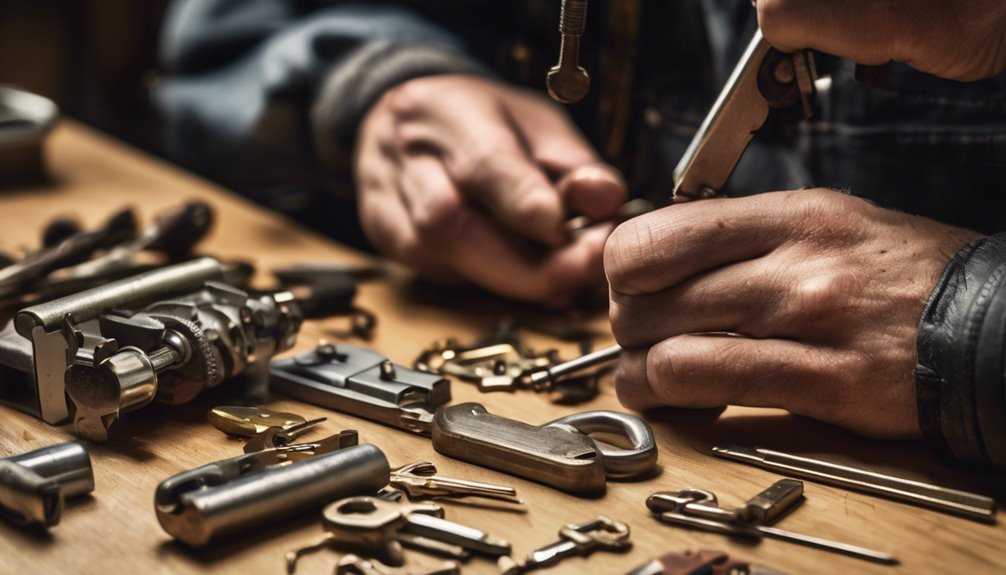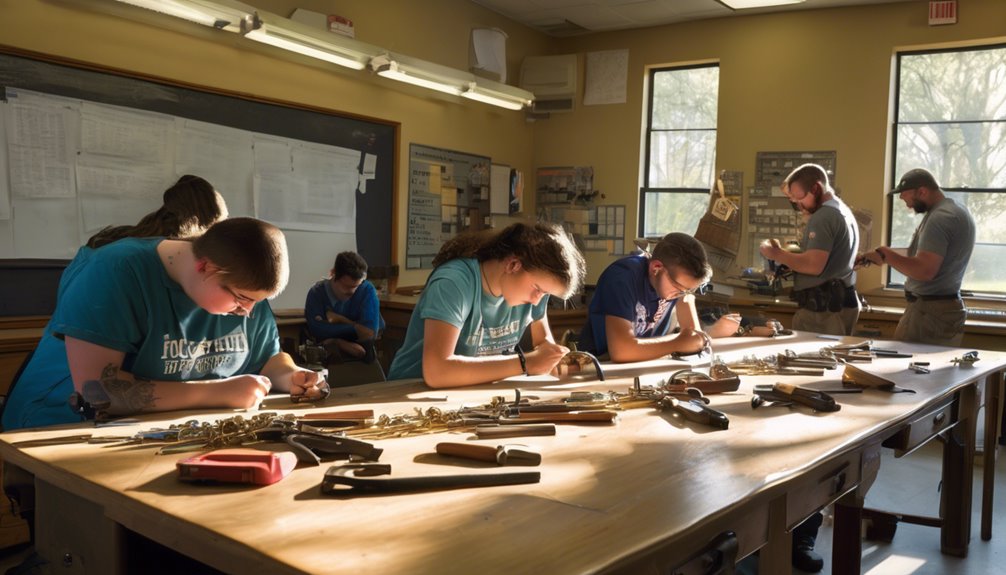If you’re considering a career as a locksmith in Texas, it’s important to understand the steps involved. You’ll need to meet specific age and education requirements, gain practical experience, and navigate the licensing process. Each phase is essential for ensuring you’re prepared for this hands-on profession. Curious about the detailed requirements and how to get started? Let’s explore what it takes to become a licensed locksmith in the Lone Star State.
Key Takeaways
- Complete a 48-hour introductory locksmith course followed by a 600-hour fundamentals course to gain essential knowledge and skills.
- Seek a licensed locksmith apprenticeship lasting 6 months to 2 years to accumulate hands-on experience in the field.
- Apply for a locksmith license online, paying the required fees and submitting proof of experience or coursework completion.
- Pass a criminal background check, ensuring no felony convictions or recent misdemeanors disqualify you from obtaining a license.
- Engage in continuing education every two years to maintain your license and stay updated on industry standards and regulations.
Understanding the Role of a Locksmith in Texas

As a locksmith in Texas, you play a crucial role in maintaining the security of homes and businesses. Your expertise in mechanical security devices, like locks and deadbolts, guarantees clients can trust you with their property. To enter this rewarding field, you’ll need to complete locksmith training programs, gaining the skills necessary to provide quality locksmith services. As a licensed locksmith, you must also undergo a criminal background check, assuring safety for your clients. The Private Security Bureau regulates your profession, emphasizing the importance of integrity in your locksmith business. By adhering to these guidelines, you not only protect others but also establish a reputation built on trust and reliability, essential for success in the locksmith industry.
Requirements for Obtaining a Locksmith License
To get your locksmith license in Texas, you need to be at least 18 years old and have either two years of experience or complete specific coursework. A thorough background check, including an FBI fingerprint check, is also necessary, as certain criminal convictions can disqualify you. Understanding these requirements will help you navigate the path to becoming a licensed locksmith successfully.
Age and Experience Criteria
Becoming a licensed locksmith in Texas requires you to meet specific age and experience criteria. You need to be at least 18 years old to apply for a locksmith license. To show your qualifications, you can either demonstrate two years of experience working as a locksmith or complete a combination of a 48-hour locksmith course and a 600-hour fundamentals course. After you’ve completed your training, you’ll need to work as a full-time locksmith for at least one year before applying for your license. Additionally, you’ll need to pass a criminal background check, ensuring you have no felony convictions or Class A misdemeanors. Finally, you must provide evidence of mental competency and prove you’re not dependent on illicit drugs or alcohol.
Background Check Necessities
Once you’ve met the age and experience criteria, the next step in obtaining your locksmith license in Texas involves a thorough criminal background check. This process guarantees you meet the state’s character and fitness standards set by the Private Security Bureau. Here are the key components to remember:
- Submit fingerprints electronically through IdentoGo and pay the $28 fee for the FBI background check.
- Be aware of disqualifying factors, including felony convictions and Class A or B misdemeanors in the last five years, along with any history of drug or alcohol dependency.
- Demonstrate mental competency; you must not struggle with drug or alcohol issues to qualify for your locksmith license.
Completing these steps is essential for a smooth application process.
Steps to Complete Your Training and Gain Experience

As you commence your journey to become a locksmith in Texas, completing the necessary training and gaining hands-on experience is essential for your success. Start with a 48-hour introductory locksmith course, followed by a 600-hour locksmith fundamentals course offered by trade schools or online institutions recognized by the Texas Department of Public Safety. Next, seek an apprenticeship with a licensed locksmith, lasting between 6 months to 2 years, where you’ll gain practical experience in lock installation and troubleshooting. Make sure to accumulate at least two years of full-time locksmith-related experience to qualify for your locksmith license. Additionally, consider continuing education to stay updated in the field, enhancing your skills and career prospects.
After gaining the necessary training and hands-on experience, the next step involves maneuvering through the licensing application process in Texas. Here’s how to get started:
After completing your training, navigate the Texas licensing application process to become a certified locksmith.
- Create an Account: Visit the Texas Online Private Security (TOPS) website to fill out the required forms and submit documentation.
- Pay the Fees: The application fee for an individual locksmith license is $30. Don’t forget the $28 fee for the criminal background check, which requires fingerprinting.
- Submit Proof of Experience: You’ll need either two years of locksmith experience or completion of a 48-hour locksmith course and a 600-hour fundamentals course before submitting your application.
Once submitted, keep an eye on your application status and be ready for any additional requests from the Private Security Bureau.
Continuing Education and Staying Compliant

To guarantee you remain compliant and at the forefront of the locksmithing industry in Texas, you’ll need to engage in continuing education every two years. This not only enhances your skills but helps you maintain your locksmith license. Here’s a quick overview of the requirements:
| Year | Hours Required | Topics Covered |
|---|---|---|
| Year 1 | 8 hours | Locksmith-related subjects (7), Ethics (1) |
| Year 2 | 8 hours | Locksmithing-related topics |
| Managers | 16 hours total | Industry standards, compliance |
| Compliance | Annual updates | Changes in laws and regulations |
| Ethics | Ongoing | Upholding ethical standards |
Staying informed about these requirements guarantees you provide professional service while upholding ethical standards. Neglecting continuing education can jeopardize your ability to renew your license, so prioritize ongoing professional development!
Career Opportunities and Salary Expectations for Locksmiths in Texas
As a locksmith in Texas, you can expect a varied salary based on where you work, with averages ranging from $37,790 in El Paso to $46,280 in Houston. While entry-level positions start around $18.17 to $22.25 per hour, experienced locksmiths specializing in advanced security can earn over $50,000 annually. However, be aware that job opportunities may be limited, as the market is projected to decline slightly in the coming years.
Salary Range by City
When considering a career as a locksmith in Texas, it’s important to understand the salary range varies considerably by city. Your hourly wage can differ, reflecting the demand for locksmiths and the complexity of security systems in each area. Here’s a quick overview:
- El Paso: Entry-level locksmiths start at around $18.17 hourly, with annual salaries about $37,790.
- Houston: You’ll find higher pay, with hourly wages reaching $22.25 and annual earnings up to $46,280 for entry-level roles.
- Experienced locksmiths: In urban areas, you can exceed $50,000 annually, especially if you specialize in advanced security technologies.
The job outlook remains positive, influenced by economic factors and evolving security needs.
Job Market Demand
The job market for locksmiths in Texas presents a mix of challenges and opportunities. While employment is expected to decline by about 2% over the next decade, around 1,700 job openings will arise each year. To thrive in this competitive landscape, you’ll need specialized skills and ongoing training.
Here’s a quick overview of salary expectations across major cities:
| City | Average Salary |
|---|---|
| El Paso | $37,790 |
| Houston | $46,280 |
| Entry-Level | $18.17 – $22.25 |
| Specialized | Higher Salaries |
With a locksmith license and commitment to continuing education, you can enhance your prospects. Networking and building a digital presence will also help you stand out in the locksmith trade.
Frequently Asked Questions
What Do You Need to Be a Locksmith in Texas?
To be a locksmith in Texas, you need to meet a few requirements. First, you’ve gotta be at least 18 years old and gain two years of experience, or complete a specific locksmith course. A background check is mandatory, and felonies or certain misdemeanors might disqualify you. You’ll also need liability insurance if you plan to run your own business. Finally, you must pay an application fee and commit to ongoing education every two years.
How Much Does a Locksmith Make in Texas?
Becoming a locksmith in Texas is like opening a door to a rewarding career. You’ll find that salaries vary across the state; entry-level positions start around $18.17 an hour in cities like El Paso, while more experienced locksmiths can earn over $50,000 annually. In bustling Houston, hourly wages can reach up to $22.25. As you gain skills and tackle complex tasks, your earning potential can grow considerably.
How Much Does It Cost to Become a Locksmith in Texas?
Becoming a locksmith in Texas can set you back between $400 and $1,000 for training. You’ll also need to budget for a $30 application fee for your individual license and $400 for a business owner license. Don’t forget about the $28.25 FBI fingerprint check fee. Renewal fees vary too, so plan ahead. Plus, consider additional costs for materials and tools, and make sure you’ve got your living expenses covered during training.
Is Becoming a Locksmith Worth It?
Thinking about a career as a locksmith? It can be quite rewarding! You’re looking at competitive wages and the chance to work flexible hours, which can lead to a great work-life balance. Plus, with low initial training costs, it’s an accessible field. Although the job market isn’t booming, there’s still steady demand for locksmith services. Staying updated through continuous education keeps your skills sharp and opens doors to new opportunities.
Conclusion
Becoming a locksmith in Texas is a rewarding journey, blending hands-on skills with a commitment to safety and security. As you open the door to this career, remember that every step—training, apprenticeship, and licensing—builds your expertise. Just like a key fits perfectly into a lock, your dedication will lead you to success in this field. By continuing your education, you’ll stay sharp and ready for new opportunities, ensuring you always hold the keys to your future.








